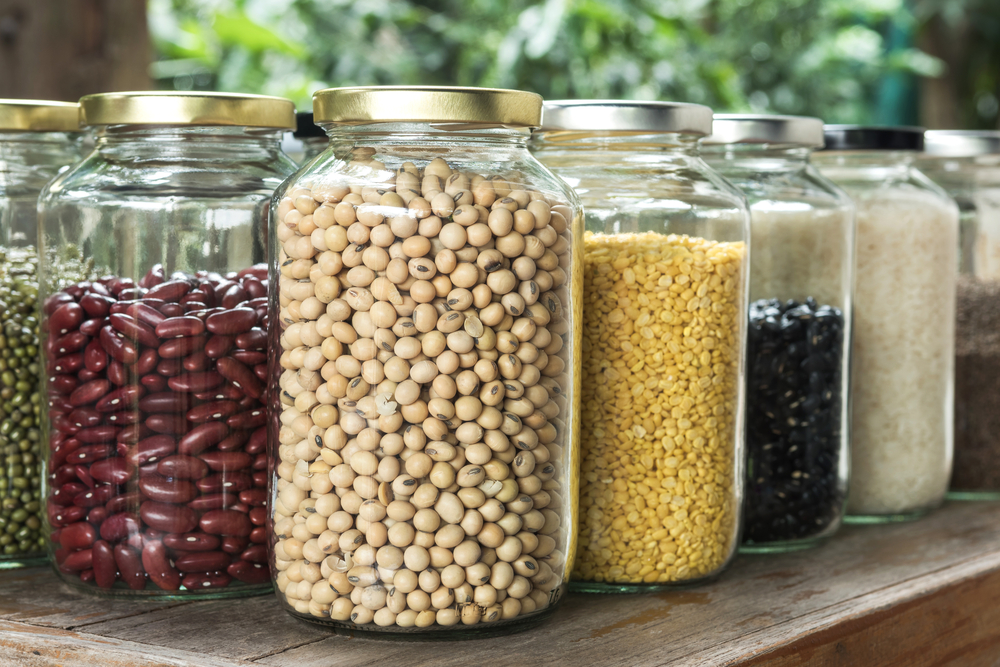Last Updated on February 23, 2023 by admin_hunter
If you are planning on storing food long term, beans are a great choice. They provide high levels of key nutrients and are easy to cook into a variety of dishes.
When stored properly dried beans can last a couple of decades, depending on the method you use. The best methods include hermetically sealed #10 cans, mylar bags, a food-grade bucket with a sealable lid, and oxygen absorbers.
Soybeans
Soybeans are among the best beans for long term storage due to their high protein content and nutritional value. One cup of boiled soybeans provides 298 calories, more than 17 grams of protein and 16 grams of fiber. They also contain more than nine essential amino acids and are a complete protein.
In addition, soybeans are rich in Vitamin B6 (pyridoxine), Vitamin K, thiamin, riboflavin and potassium. They are a good source of calcium and iron.
When harvested, soybeans should be at about 18% moisture or less to maximize the storability of the crop. Waiting until the soybeans are too dry increases the risk of cracking, splits and cracked seed coats that can affect yield, germination and seed quality.
The best harvest timing for soybeans depends on soil conditions, moisture availability and the amount of mechanical damage the crop has undergone. Early plantings in May and June can increase yields under favorable soil conditions but produce a smaller crop in years of wetter weather.
If you want to store your beans for long periods, the best way is to bury them in large metal containers such as silos or buildings designed specifically for grain storage. These can be placed in a climate controlled area and are usually surrounded by fans to help keep the moisture level in the soybeans at the correct levels.
As a result, the grain will have a much longer shelf life than if they were stored in a traditional storage bin. These containers can be made from wood, brick or concrete and are usually insulated to prevent the buildup of moisture.
If you are going to store your soybeans in a container, it is important to monitor them regularly to ensure that they are not being damaged by insects or fungi. In order to do this, you must check the moisture level, temperature and any other signs that your beans are in danger of spoiling.
Split Peas
If you’re looking for a good long term food storage option, look no further than split peas. These are a great source of fiber and protein and are rich in vitamin K, which is helpful for bone health.
Stored in a cool, dry place with proper humidity, split peas can be stored for years. They may lose some of their color over time, but their flavor is usually still good.
They are a healthy addition to your pantry and can be used in soups, stews, and casseroles. They are also a good source of calcium and magnesium.
For best quality, store dried split peas in an airtight container or resealable plastic freezer bag. Dried peas should not be opened until the expiration date on the package has passed and there are no signs of spoilage (see below).
The best way to tell if dried split peas have gone bad is by their texture, appearance, and smell. If they have any off odors or smell funky, they should be discarded immediately.
In addition, fuzzy patches on the outside of the bag and green spots inside are a sign that the bag has become overgrown with mold. These areas should be wiped clean before using the peas.
Dried peas can be rehydrated by placing them in a bowl of water and letting them sit for several minutes. They should be able to return to their original shape and texture once they’ve been rehydrated.
Pinto Beans
Pinto beans are an American favorite, and they are one of the best beans for long term storage. They are high in protein and fiber and contain numerous nutrients, including thiamine (vitamin B1), iron, magnesium, potassium and zinc.
Besides being popular as a side dish, pinto beans are also great for soups and stews. They are also often included in baked goods as a meatless protein source and can be used to replace ground beef in many recipes.
When dried pinto beans are stored properly, they should have a shelf life of 10 years or more. The best way to store them is in an air-tight container that has a tight seal, such as a plastic or Mason jar. This will prevent moisture from entering and spoiling the beans.
Another option is to vacuum seal them inside a glass canning jar. This method will also ensure that the beans stay fresher longer, but it may require some extra preparation.
You should make sure to rinse the beans before storing them, and to soak them overnight if possible. Rinsing helps to remove any residue that can contribute to the formation of mold and bacteria.
The soaking process can also help to speed up the cooking time of the beans. A ratio of 3 cups of water per cup of beans is recommended for a successful soak.
Beans that are soaked and cooked without salt or other additives are low in fat and sodium. In addition, they are low in cholesterol and gluten-free.
When choosing a substitute, be sure to experiment with different types of beans to find the best fit for your recipe. Chickpeas, kidney beans and white beans are some good options. They may not be as earthy or nutty in flavor, but they are great alternatives to pinto beans for Mexican and Southwestern cuisine.
Kidney Beans
While some people may be wary of storing large amounts of dried beans, the fact is that they are one of the best foods to store in the event of a long term food crisis. If properly stored, beans can be expected to last 10 years or longer in most cases.
The best way to ensure that your long term beans are well preserved is to vacuum seal them in a plastic bag or other airtight container. This process eliminates all the air that would cause them to spoil and dry out.
As a bonus, vacuum sealed beans also tend to be less expensive than their conventional counterparts. If you are a true prepper, vacuum sealed beans are an excellent addition to your food storage plan.
Kidney beans are a good choice for the long term prepper as they are easy to cook, and have a great nutritional value. They are a great source of fiber, carbohydrates, protein, and vitamins.
They are commonly found in chili and bean salads as well as in an assortment of rice dishes. They also make a fantastic main course when cooked properly.
Adzuki beans are a great way to get the caloric benefits of red kidney beans in a more convenient and portable package. They are also a good source of fiber, and are high in the vitamin b complex and the antioxidant lycopene.
They are also a good source of iron, potassium, folate, and phosphorus. They are also a great source of healthful fats and are good for your heart. The best way to enjoy adzuki beans is to make sure they are properly soaked and cooked before serving.
Black Beans
Dried beans are an excellent way to add flavor and variety to your meals. They can also be used as a viable substitute for fat in many dishes, such as soups and stews.
Beans are generally considered non-perishable and can last up to 10 years if properly stored. However, they will start to lose their nutritional value as well as their taste if not kept in ideal conditions.
The best way to store dried beans for long term is to freeze them in a freezer bag. This will help to keep them from developing mold, fungi and insects that can damage them.
Soaking isn’t required for dry beans, but it can be helpful to make them softer before cooking. This will allow them to cook more quickly and create a creamier consistency when rehydrated.
If you want to extend the shelf life of your beans, you can store them in a cool, dark place at under 75degF (your pantry is a great choice). This will help prevent light, heat and humidity from harming the beans.
Using buckets and food-grade packaging are great ways to protect your beans from UV light. They will keep them fresh longer than the plastic bags that most stores sell them in.
Another good way to store dried beans is in Mylar bags with oxygen absorbers. These will keep them fresh for years to come, and they block out light that could spoil your beans.
Dried beans are a versatile and nutritious staple for every kitchen. A small amount of them can easily fill up several bellies, and they are extremely affordable. So be sure to stock up on a variety of beans when you’re at the store!

